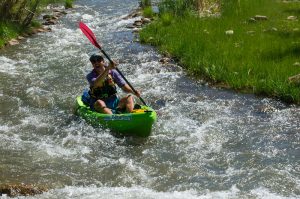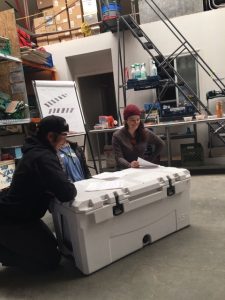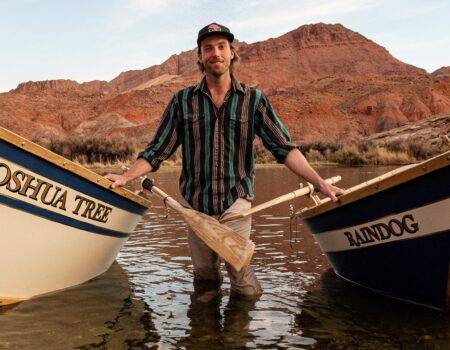
Let’s Talk About It: Mental Health First Aid
By Jean-Philippe Clark

Jean-Philippe Clark is GCY’s Operations Director. He originally came to Grand Canyon Youth in 2007 as a youth himself. Inspired by the water, the people, and the experience he decided to simply never grow up. Now years later, he still finds his home sitting on a boat with nowhere to go but downstream and a heart-filled duty to play.
Mental health can be challenging to talk about.
When outdoor professionals learn about patient medical care in remote outdoor settings, they typically start with a Wilderness First Responder (WFR) course. For me, the 10 days of intense medical jargon and hands-on scenarios was a lot to ingest.
Though robust, the WFR course does not thoroughly prepare us to address a critical aspect of staying safe in the wilderness (and beyond): mental health. So, when presented with someone in a mental health crisis, I, like many others, freeze. It can be an uncomfortable, emotional, and triggering experience.
River trips frequently push young people out of their comfort zones – and that’s a good thing! But with it comes the potential that past traumas or powerful emotions can come to the surface, especially when surrounded by peers and adult mentors who create a supportive environment. It has been well-documented that depression, anxiety, suicidal thoughts, and other mental health challenges are increasingly common among young people. In order to train GCY guides to address these issues in the field and connect young people with resources after their expedition, Grand Canyon Youth (with support from the NARBHA Institute) now offers a Mental Health First Aid training to all field staff.

GCY office and field staff participate in a Mental Health First Aid training at the GCY Headquarters in Flagstaff.
This skills-based training course teaches our guides and drivers about mental health and substance-use issues. Just like WFR and CPR, we need to learn the tools of what it takes to aid someone in a mental health crisis. We need the practice, we need the scenarios, and we need to dive into a subject that is often overlooked. We learn how to assess for risk and where to lead the conversation. We tackle myths and have conversations about the reality of working with youth.
This training supports GCY’s overarching goal of providing life-changing experiences for youth in a supportive environment where, in some cases, mental health challenges are faced head-on. Our goal is for our guides to have the skills to safely facilitate that process on the river as the need arises, and for youth to emerge from their expedition feeling supported and knowing what resources are available should they need additional help.
It is a difficult topic, but we need to talk about it. We need to practice the patience and skills required to listen non-judgmentally. We need to know we are not alone, both as the caregiver and as the individual in crisis. As outdoor professionals, especially when working with youth who perceive us as mentors, we have a responsibility to lead by example. How we perform, shaped by practice, is vital.
The Mental Health First Aid course that GCY was able to provide was amazing! It was a great way for a diverse group of people with a variety of insights and experience to discuss and learn about important content together. I have thought about and used the information that I learned about often as a 5th grade teacher. The course has allowed me to feel confident in my approaches to students, be aware of signs to look out for, and to be a better listener and supporter to all of the people in my life. I think the best part of the course was the discussion of mental health that we had in our session. Someone stated that mental health is just like our physical health, we all get sick sometimes. This was transformational for me because it has allowed me to truly recognize that any person of any age can experience difficulties with their mental health, so the more people that have this training, the better we can take care of our youth and society. I honestly wish that every person that works with youth (teachers included!) were required to take this training!
-Ashley, GCY Trip Coordinator

